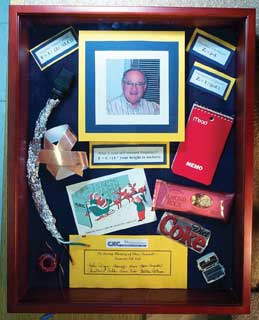 |
| The shadow box includes EMI
troubleshooting aids, often used and taught formulas
(capacitor / inductor values, impedance of an inductor,
impedance of a capacitor and self-resonant frequency),
a Christmas card with Chris waiving to Santa, who is
exiting the EMC lab with compliant toys, Diet Coke,
Almond Roca and Chris’ ever present pocket memo
book. |
There is a very nice Chris Kendall memorial article in this
issue written by Steve Jensen. As I read what Steve, and many
others, has written about Chris, I feel blessed and humbled
to have been associated with him. Chris graciously allowed
me to take on the endeavor of editing the Chapter Chatter
column. He was also the source of several humorous EMC stories
that have been shared here. Chris will be greatly missed by
his employees, colleagues and family. I’m sure some will
even miss his corny jokes. “We hail from the little town
of Mariposa, which is famous for the fact that both city limit
signs are on the same post,” was how he started seemly
every seminar he taught. Chris had an uncanny ability to teach
EMC fundamentals with a fun and interesting twist. Helping
engineers to learn their self-resonant frequency was one of
Chris’ favorite ways to make them aware of standing waves
from slots, seams, etc. The staff of CKC Laboratories in Fremont,
California created the shadow box (see picture) that perfectly
captures the professional and personal memories that many
people have of Chris. |
France
André Berthon of the French Chapter reports that a meeting
was held on November 11th at the Institut Supérieur d’Electronique
de Paris. The meeting was devoted to a presentation by EMCS Distinguished
Lecturer, Professor Michel Ianoz, on “EMC Problems Related
to Powerline Communications,” addressing all problems related
with PLC’s including test methods and norms. The lecture
was followed by a lively discussion from a very interested audience.
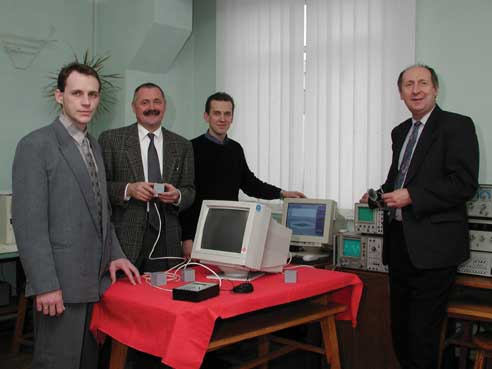 |
| Attendees at the “Information
Measuring Equipment for Electromagnetic Monitoring of Technological
Objects” seminar included (from left) Ass. Prof. O. Zaporogets,
Prof. G. Churyumov (Kharkov Joint Chapter Chair), Ass. Prof.
V. Degtyarev, and Prof. I. Ruzhentsev. |
Kharkov (Ukraine)
Gennadiy Churyumov, Kharkov Joint Chapter Chair, reports that
2003 was very active for his Chapter. Several meetings and seminars
were held in the first half of 2003. Dr. Idrissi Yahyaoui Khalid
presented the paper entitled “EMC in Telecommunication Networks”.
Other papers presented included one by Dr. Vladimir Oliynyk entitled,
“EMC in Mobil Communication Systems: Theory and Methods”.
Also, two seminars took place last spring and summer. Professor
Igor Ruzhentsev organized and chaired these seminars. The first
was held on April 16 and was entitled, “Information Measuring
Equipment for Electromagnetic Monitoring of Technological Objects”.
A second regional seminar entitled “Harmonization of International
and National Standards for Certification of ISM Equipment”
was organized in Kharkov (Ukraine) on June 11. About 60 engineers
and scientific workers attended the seminars. In the second half
of 2003, the Kharkov EMC Society Joint Chapter provided technical
support for two international conferences. First, was the Fourth
International Conference on Antenna Theory and Techniques (ICATT’03),
held in Sevastopol (Crimea, Ukraine) September 9-12, 2003. More
than 200 participants from Ukraine, Russia, Netherlands, Italy,
and Canada attended. Second, the International Conference on Noise
Radar Technology (NRT’03) was held in Kharkov (Ukraine) October
21-23, 2003. More than 100 participants from Ukraine, Russia,
USA, and Sweden attended.
Korea
Jong Hwa Kwon, the past IEEE EMC Korea Chapter Secretary, reports
that they have newly elected Chapter officers. The new Chapter
officers took office for two years beginning in January 2004.
The new Chairman is Professor Jeong Ki Pack of the Department
of Radio Science and Engineering at Chungnam National University.
The new Chapter secretary is Mr. Jong Hwa Kwon with the Division
of Radio Technology and Electronics at the Telecommunications
Research Institute (ETRI).
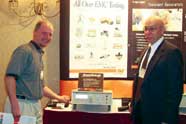 |
| At the Milwaukee EMC Chapter event
in March, Tom Moyer of Amplifier Research (right) showed Steve
Klinger of Plexus Technology Group how “Breakthrough”
technology can create a product so lightweight that you can
lift it with just one finger. |
 |
| A very attentive audience listens
to Don Heirman’s EMC standards presentation. |
 |
| Don Heirman receives a “Cow
Box” from Jim Blaha, Milwaukee Section EMC Chapter Chair,
in appreciation of the excellent standards presentation. |
 |
| Don Heirman discussed everybody’s
favorite topic – EMC Measurement Uncertainty! |
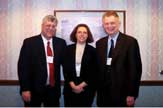 |
| Jim Blaha of L.S. Compliance chaired
this year’s seminar with Teresa White of L. S. Compliance
and Don Heirman (from left). |
 |
| “Leo’s back in town!”
Leo Makowski of HV Technologies (right) visited with Kevin
McDermott of Rockwell Automation at the Milwaukee Chapter’s
March EMC Seminar. |
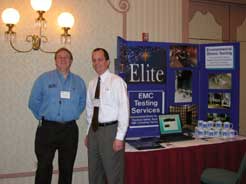 |
| Jack Black of DLS Electronic Systems
(left) and Steve Laya from Elite Electronic Engineering discuss
relevant EMC issues at the Milwaukee EMC Chapter seminar. |
 |
| Frank Krozel from Electronic Instrument
Associates (left) and Tom Moyer from Amplifier Research enjoy
a few minutes between technical sessions at the Milwaukee
EMC Chapter seminar. |
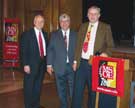 |
| Pictured from left are Dr. Hermann
Viets, President of the Milwaukee School of Engineering, Jim
Blaha, EMC Chapter Chair and IEEE Milwaukee Section Chair,
and Dr. Ulrich Rohde, Chairman of Synergy Microwave Corporation
at Dr. Rohde’s dinner presentation to IEEE members and
students. |
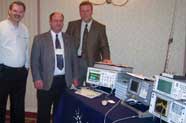 |
| Tom Holmes of Agilent Technologies,
Dr. Bob Strangeway of the Milwaukee School of Engineering,
and Mike Larsen of Agilent Technologies (from left) review
the current Agilent product offerings for EMC engineering
at the March Milwaukee Chapter event. |
 |
| Frank Krozel of Electronic Instrument
Associates (leaning right) demonstrates new products from
EM Test. |
Milwaukee
Jim Blaha, the Milwaukee Section EMC Chapter Chairperson, reports
that this past fall the Milwaukee EMC Chapter, along with the
sponsorship of the Milwaukee School of Engineering, was honored
to have as a dinner speaker Dr. Ulrich Rohde. Dr. Rohde addressed
an audience of over 50 IEEE members and IEEE student members.
The topic of Dr. Rohde’s presentation addressed the third
generation of Global Technology, which will be focused on the
UMTS-Digital System. This system will seek to incorporate multimedia
communications and very high quality video images. UMTS stands
for Universal Mobile Telecommunication System. UMTS will deliver
low cost, high capacity mobile communications offering data rates
up to 2Mbit/sec with global roaming and other advanced capabilities.
Dr. Rohde also emphasized, “Technology cannot become a topic
which is decided by politics”. As global students, we need
to maintain a good mix between tradition and society demands.
Country barriers are disappearing and success lies in education
and commitment to excellence. It was especially significant for
the attending IEEE student members to hear from Dr. Rohde that
in the future, “Global Students” will come from all
countries and all will become global professionals. This joint
meeting of active EMC Chapter members along with IEEE Student
Members provided an excellent forum for student engineers to experience
the vision and wisdom of Dr. Rohde, of Rohde & Schwarz fame.
This past March, the Milwaukee EMC Chapter sponsored its third
in a continuing series of EMC educational seminars. The honored
speaker for our March seminar was Mr. Don Heirman. Over 65 attendees
and 24 vendors of EMC related products and services spent the
day with the “Big Cheese” of EMC standards. Don’s
presentation focused on the world of EMC standards and their relationships
to each other. Attendees from Rockwell Automation, GE Medical
Systems, Plexus Technology and Cooper Power Systems all responded
with a near excellent rating of this seminar and our speaker.
The seminar survey also provided the following comments: “Great
dollar value for the educational content” and “continued
study of the handout materials is essential.” One attendee
also requested the Milwaukee Chapter to, “continue with the
scheduling of quality speakers.” Previous to Mr. Heirman,
the Milwaukee Chapter sponsored seminars with Dr. Clayton Paul
and Mr. Lee Hill. All 65 attendees that submitted surveys responded
that they would attend another educational program like this one
in spring of 2005. Ideas are already being developed to continue
the commitment of providing the highest level of EMC educational
programs at a price that meets today’s budget restrictions.
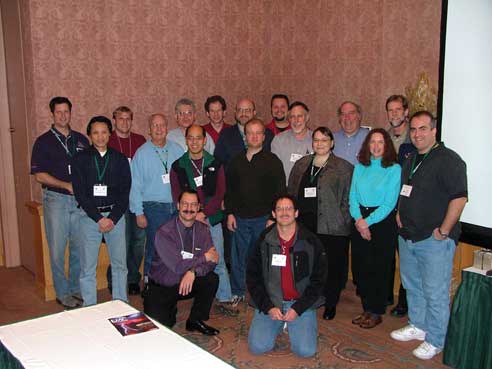 |
| The Oregon and SW Washington Chapter
attendees at the Seattle Colloquium along with Bruce Archambeault,
Lee Hill and Seattle Chapter Chair, Pat André. |
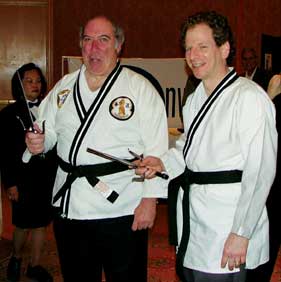 |
| Bruce Archambeault and Lee Hill ensured
that everyone got the “point” during their “cutting
edge” presentations. |
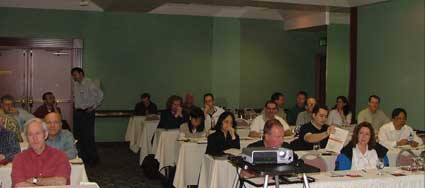 |
| Oregon and SW Washington Chapter
attendees at the seminar sponsored by Amplifier Research and
presented by Bill Parker. |
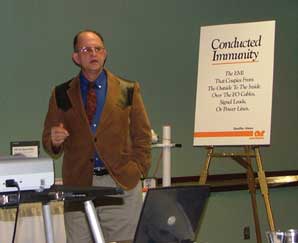 |
| Bill Parker of Parker EMC shared
several unique testing experiences during his presentation. |
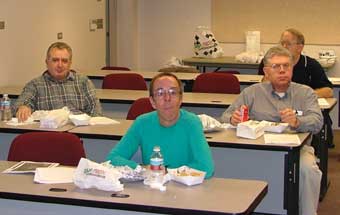 |
| Chapter meeting attendees enjoyed
dinner before Bill Owsley’s presentation. |
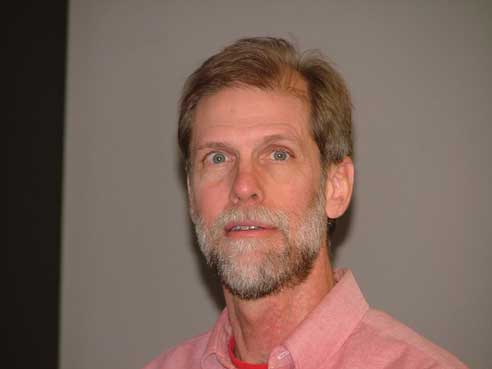 |
| Bill Owsley of Underwriters Laboratories
during his “Ethernet Design for EMC” presentation. |
Oregon and SW Washington
Dave Britton, Vice-Chair, reports that the Oregon and SW Washington
Chapter kicked off the new-year with a road trip in January. Fifteen
Chapter members left the Portland area in two rented vans at 5:30
am. We headed to Seattle for their Chapter colloquium which featured
the “Bruce - Lee” show. We arrived just in time for
a quick cup of coffee before the presentations began. As you can
see, the presenters left the crowd with some “new pointers.”
A great deal of camaraderie was developed amongst the travelers
in the six hour round trip. It was a great opportunity for our
Chapter to meet members of the Seattle Chapter. In February the
Chapter attended a half-day seminar sponsored by Amplifier Research.
Bill Parker, of Parker EMC, did an engaging presentation on RF
Immunity/Susceptibility Testing. AR graciously provided lunch
to all attendees. The Chapter presented AR with a plaque of appreciation
at the end of the seminar. In March, the Chapter’s Treasurer,
Bill Owsley of Underwriters Labs, gave a presentation on “Ethernet
Design for EMC”. The meeting was held at Portland State University.
The presentation generated much discussion, as this subject is
near and dear to many of us in the field. Attendees enjoyed a
burrito dinner before the meeting.
The Chapter’s remaining spring 2004 events are as follows:
• Distinguished Lecturer CW Lam from Apple
will present to our Chapter on April 28th.
• William Parker of Parker EMC will return to our Chapter
on May 19th.
For details on the above meetings and
to RSVP, check our website at:
https://www.worldaccessnet.com/~emc/
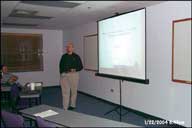 |
| Richard Remski explores the mysteries
of power integrity with the Rocky Mountain Chapter in January.
|
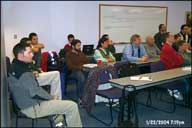 |
| The Rocky Mountain Chapter soaks
in the information during the January meeting. |
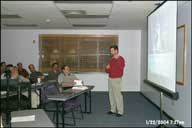 |
| Brad Brim lectured on signal integrity
simulation at the Rocky Mountain Chapter’s January Meeting. |
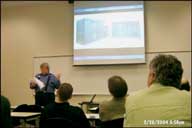 |
| Larry Ernst shows the Rocky Mountain
Chapter a really big printer! |
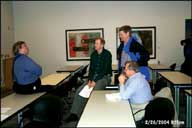 |
| The meeting after the
Rocky Mountain Chapter’s February meeting. |
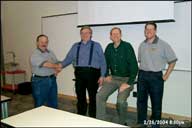 |
| The Rocky Mountain Chapter officers
thank Larry Ernst for his presentation on EMC in large printers. |
Rocky Mountain
The 2004 campaign started very strongly with a double-header event
in January. The Chapter was very fortunate to have two of the
most senior application engineers from Ansoft Corporation (https://www.ansoft.com)
present how simulation can head off serious signal integrity issues
in high-speed systems and in power distribution design. The first
presentation was presented by Brad Brim, their High Frequency
Marketing Manager, titled “Signal Integrity Issues for High
Speed Serial Channel Design.” In this presentation, Brad
showed how the electrical behavior of an entire 3.2 Gigabit per
Second serial channel was analyzed using EDA software tools. The
PCB traces, multi-layered vias, board-to board connectors and
board-to-cable connectors were all analyzed and combined to yield
a full channel model. The individual parts of the channel and
their interaction were examined to predicatively re-design the
channel for maximum bandwidth. In the second presentation, Richard
Remski flew all the way from Florida, stopping here on his way
home to Texas. Although he was, in his words, a little jet lagged,
he still managed to hold the audience with his presentation titled
“Analysis of PCB Power/Ground Plane Decoupling with New Solver
Technology.” This presentation centered on a new discipline
building in the electronics community, that of Power Integrity.
Richard showed that the proper understanding and mitigation of
power and ground plane behavior has become increasingly important
as PCB designs incorporate increasing trace density, increasing
layer counts, and tightened operational specifications. Traditional
analysis methods have been insufficient to rapidly address true
distributed power and ground structure behavior, requiring the
application of general rules-of-thumb, such as preventative decoupling
strategies. A new two-dimensional finite-element solution technology
now permits true analysis of even complex power and ground configurations,
allowing direct pre- or post- route analysis of various decoupling
options. This paper outlined the solution technology, provided
verification comparisons to measurements to validate its accuracy,
and proposed a design methodology that may allow more optimized,
cost-effective decoupling strategies. The Chapter’s February
meeting was a fully local event when one of the Chapter’s
own members shared his experiences designing large printers for
IBM. In a talk titled (appropriately), “EMC Concerns in Printers,”
Larry Ernst certainly changed our preconceptions on what kind
of problems he has to deal with. Most of the folks that attended
this meeting had an idea of what the printers in Larry’s
talk would look like - small devices hooked to a PC, sitting on
a desk, in a plastic case, etc. Imagine the surprise then when
Larry put his first slide up for all to see. Pictured was something
far from a common desktop printer! A typical configuration consists
of two cabinets 5 feet high, 11 feet long and 4 feet deep, with
typical applications being on-demand books, IRS checks and so
on. These types of electromechanical devices present many difficult
EMC compliance challenges such as electrostatic discharge sources
within the device. Changes to the EN 61000-3-11 (flicker) standards
and the impact on designs was discussed, with a short review of
radiated emissions reduction techniques. The presentation concluded
with a discussion on the relationship of a product organization
and EMC. An organizational example was discussed which was the
genesis of an inexpensive radiated emissions solution. Finally,
there is some RM EMC Chapter business to pass along. In a recent
election, the following folks were confirmed as officers of the
Chapter: Charles Grasso (Chair), Matt Aschenberg (Vice-Chair),
Monrad Monsen (Secretary). You will notice that Monrad is seated
in our group picture. He is (shall we say) quite a bit taller
than most and he agreed to that small concession for the picture!
The officers of the Rocky Mountain Chapter are pleased to announce
an increase in the scope of the Chapter. We have been officially
approved to change the name of the Chapter to include the IEEE
Signal Integrity Society. We are excited with this change and
new challenge.
Santa Clara Valley
Darryl Ray reports the EMC 2004 Symposium in Santa Clara is really
taking shape. The Symposium now has over 330 technical papers
and workshop presentations planned. To date, over 200 exhibit
spaces have been sold which is an increase over the EMC 2003 sales
rate. The committee has worked very hard to improve the layout
of the advance and final programs in order to allow the attendees
to “session hop”. The advance program has been sent
to the printer and should be available by mid May. The Wednesday
evening gala will be held at the Mountain Winery in the hills
above the Silicon Valley. We had many favorable comments about
the Mountain Winery from the 1996 EMC Symposium. It’s time
for a repeat of this really nice event. To register, download
the advance program, and to get the latest information about EMC2004,
please see www.emc2004.org.
Don’t forget to “remind” your boss as advance registration
ends July 9. We need your help to spread the word to help us promote
the symposium. Promotional brochures, posters and advance programs
are available by contacting the IEEE EMC conference planner at
the address below. We look forward to seeing you in Santa Clara
August 9-13!
For EMC 2004 brochures, posters and advance programs, please contact:
Vita Feuerstein,
CMP, Senior Conference Planner
IEEE Conference Management Services
445 Hoes Lane, Piscataway, N.J. U.S.A. 08855-1331
Tel: US and Canada: +1 800 810 4333 or
Tel: +1 732 562 6826
Fax: +1 732 981 1203
Email: vita@ieee.org
https://www.ieee.org/conferences/
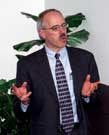 |
| Dave Walen of the FAA emphasizes
a point during his presentation to the Seattle EMC Chapter
in February. |
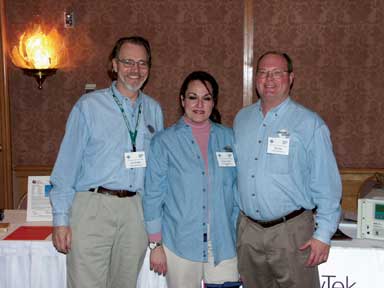 |
| Leo Smale, Cindy Catlin and Bill
Hall of Lionheart Northwest (from left) represented one of
many companies that exhibited at the Seattle EMC Chapter Colloquium
and Exhibition on January 20. |
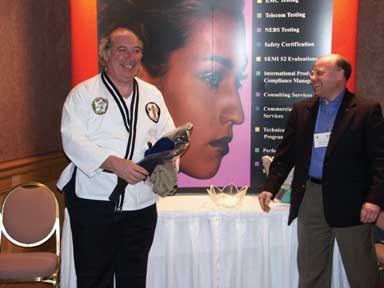 |
| Bruce Archambeault (left)
receives a raffle prize donated by Underwriters Laboratories
following the technical presentations. Dan Arnold of UL looks
on with glee. |
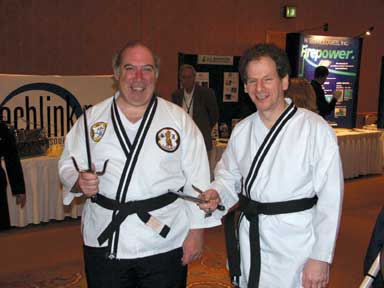 |
| It’s not often one witnesses
the transformation of EMC presenters by day to EMC busters
by night! But, that’s what happened at “The Bruce
Lee Show” organized by the Seattle EMC Chapter. |
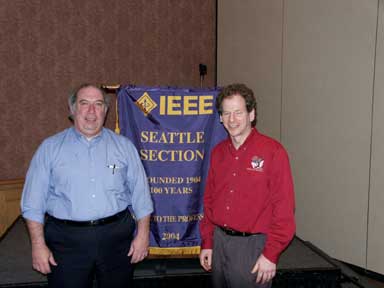 |
| Speakers Bruce Archambeault of IBM
(left) and Lee Hill of Silent Solutions pause in front the
IEEE Seattle Section banner, which commemorates the Section’s
100-year anniversary. |
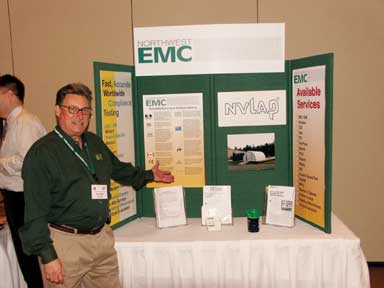 |
| Jerry Page of Northwest EMC is ready
to go with his tabletop display at the Seattle EMC Chapter
Colloquium and Exhibition. |
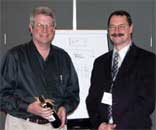 |
| Pat André presents speaker
Ghery Pettit of Intel (left) with a bottle of red wine as
a thank you “speaker’s gift” for his excellent
presentation to the Seattle Chapter. |
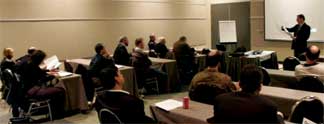 |
| Pat André calls the March
Seattle EMC Chapter meeting to order. The meeting was held
at Meydenbauer Convention Center in conjunction with Northcon. |
 |
| The February Seattle EMC Chapter
meeting provided the opportunity for the 1999 Seattle Symposium
Committee to reunite. Shown from left to right are John Windell,
Myles O’Bryne, Janet O’Neil and Dave Walen. |
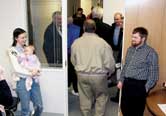 |
| The Seattle EMC Chapter meeting attracts
visitors of all ages! |
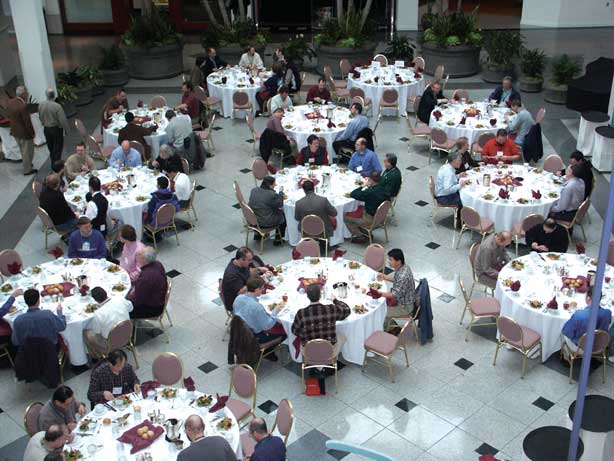 |
| EMC, technical, and social discussions
occurred during the excellent lunch break held during the
Seattle EMC Chapter Colloquium and Exhibition. |
 |
| The presentations were interesting
and captured everyone’s attention. Nobody in this crowd
was sleeping in Seattle! |
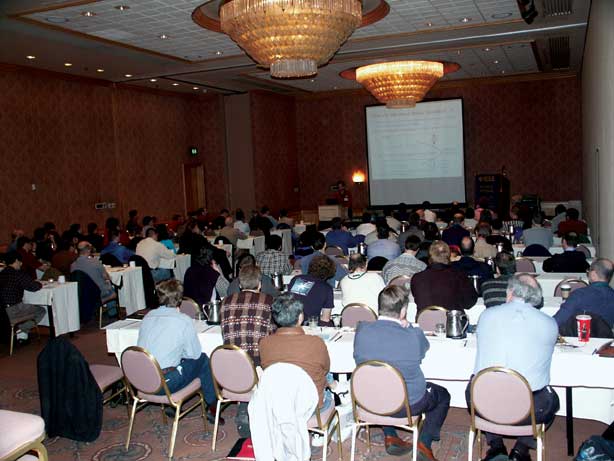 |
| It was a full house for the January
Seattle Chapter event with many attendees registering at the
door. |
 |
| Before and between the presentations
at the Seattle Chapter Colloquium and Exhibition, the attendees
had refreshments and visited the exhibitor’s tabletop
displays. |
Seattle
The Seattle Chapter held a colloquium and exhibition with Lee
Hill of Silent Solutions and Bruce Archambeault of IBM on January
20. Over 120 EMC professionals and students attended this one-day
event held at the Hyatt Regency Hotel in Bellevue. While widely
known as the “Bruce Lee Show” due to the colorful characters
involved, the “professional” title was “EMC Design
Concepts and Applications for the Real World.” Mr. Hill covered
the topics “Inductance in PC Boards, Connectors, and Cables”
(which included demonstrations), and “Illustrations and Demonstrations
of Signal Returns, Grounds, and Ground Problems in Product Design.”
Dr. Archambeault presented “The Ground Myth” along with
“Decoupling of PC Boards for EMC and Functionality in the
Real World.” His book PCB Design for Real-World EMI Control
was a sell-out at this event. The highlight of the day was the
reception with the many participating tabletop exhibitors. Mr.
Hill and Dr. Archambeault “dressed” for the occasion
much to the delight of the audience. The exhibitors offered several
raffle items. All enjoyed the hearty buffet of appetizers, drink
tickets for the open bar, and camaraderie found in this festive
environment. Many attended advised that they learned things they
could use on the job – the very next day! All agreed it was
a top-notch technical program and that the speakers kept things
lively and educational. Kudos go to Len Carlson for handling registration
and to Seattle Chapter Chair Pat André who doubled as Emcee
and kept things running smoothly throughout the day. In February,
the Chapter was excited to have Dave Walen, the FAA’s Chief
Scientific and Technical Advisor – Electromagnetic Interference
and Lightning, speak on “Flying with Your Mobile Phone –
What’s the Problem?” This presentation, held at CKC
Labs in Redmond, attracted the largest audience to date at our
regular evening meetings for 2003/2004. Over 40 people were present
to hear Mr. Walen’s clear, entertaining, and informative
presentation. He explained the challenges faced by the FAA and
the airline industry by today’s personal electronic equipment.
Many of his comments made the attendees think about these challenges
from a different perspective. It was very enlightening! In early
March, the Chapter learned the sad news of the passing of Chris
Kendall of CKC Labs. The Chapter has met regularly at CKC Labs
in Redmond over the years and had been treated to several seminars
presented by Mr. Kendall. His generosity in sharing his time and
talent for EMC education will long be remembered. Chair Pat André,
in fact, opened the March meeting with an acknowledgement of Chris
and a moment of silence. The meeting was held in conjunction with
Northcon at the Meydenbauer Center in Bellevue. Ghery Pettit of
Intel and former Seattle Chapter Chair, gave a presentation on
“CIPSR 22: Current and Proposed Requirements for ITE Equipment.”
Mr. Pettit, as co-convener of CISPR SC I WG 3, gave an expert
summary of this document and the evolution of its on-going revisions.
CISPR 22 serves as the basis for emission limits for most countries
regulating the emissions of Information Technology Equipment (ITE).
It was a thorough and informative presentation.
SE Michigan
The SE Michigan EMC Chapter is very active! In February, they
organized a special event at the Ford Motor Company Conference
and Event Center in Dearborn, Michigan. Held over February 3 and
4, this IEEE/SAE event was titled “Automotive EMC Standards
Workshop”. Speakers from the “Big Three”, i.e.
Ford, DaimlerChrysler, and General Motors all participated. In
addition to automotive EMC standards, topics presented also included
NARTE (personal certification and the examination) by Russ Carstensen,
an ISO 17025 lab quality system by Dan Hoolihan, and a review
of new Ford, GM, and DaimlerChrysler EMC requirements and applications
by their respective personnel. Over 175 people attended! Kimball
Williams of UL, Scott Lytle of Yazaki North America, Poul Andersen,
recently retired from DaimlerChrysler, Graeme Rogerson of Lotus,
and Mark Steffka of GM all played a major role in the success
of this event. The Chapter is now focusing on another big event,
this one on May 6 with speaker Tom Van Doren of the University
of Missouri at Rolla. This promises to be an equally well-received
event.
Sendai (Japan)
The Sendai Chapter is pleased to announce the following officers
have been elected for a two-year term (2004/2005):
Chair: Professor Tasuku Takagi
(Tohoku Bunka Gakuen University)
Vice-Chair: Professor Akira Sugiura (Tohoku University)
Treasurer: Professor Hideaki Sone (Tohoku University)
Secretary: Professor Hiroshi Echigo (Tohoku Gakuin University)
The Chapter membership is excited about promoting our Chapter
activities and the EMC Society! The Sendai Chapter has a number
of technical meetings planned this year. Also, the 2004 International
Symposium on EMC04/Sendai will be held June 1-5. For more information,
please visit the Chapter’s website at https://www.ieice.org/emc04/
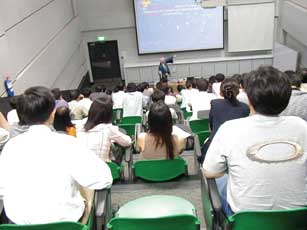 |
| The audience at the Singapore Chapter
meeting listened with keen interest during the discussion
led by Elya Joffe. The lecture hall was near full capacity. |
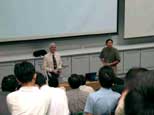 |
| Elya Joffe (left) and Dr. Kye-Yak
See (on the right), Chapter Chair, answers questions following
the presentation. |
 |
| Elya Joffe (far left) addressed the
Singapore Chapter during the January meeting. |
Singapore
The Singapore Chapter meeting on January 13th was held in a lecture
theater at Singapore Polytechnic. A nearly full house of 67 participants
came to the early evening meeting. Elya B. Joffe (a member of
the EMC Society Board of Directors) spoke on the topic of “Principle
of the Path of Least Inductance and Its Implications in Circuit,
Cable and Grounding Design.” The general atmosphere of the
meeting was informal and the participants enjoyed ideas about
current return path. Based on the very basic principle of least
inductance, Mr. Joffe made EMC design of circuit and grounding
a science rather than “black magic,” which is what most
designers think is the case. This lecture was originally planed
for one and a half hours but the keen interest and questions of
the audience kept it going for two hours! The Singapore Chapter
will be conducting a series of one-day short courses in the coming
months. One of the proposed topics is “EMI/EMC Measurements”
by Dr. Alphones (Senior Member). Interested parties can contact
Tim Foo at fwj@np.edu.sg by
E-mail for the details.
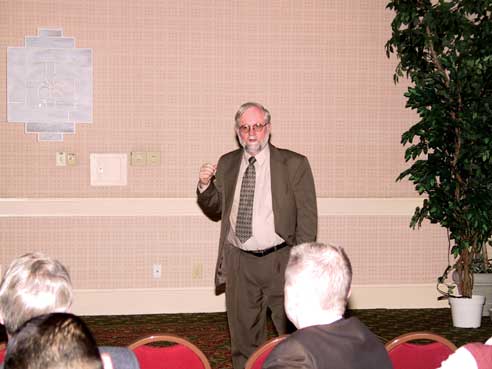 |
| Mike Hatfield of the Naval Surface
Warfare Center Dahlgren Division explains the importance of
performing electromagnetic testing with predictable uncertainties. |
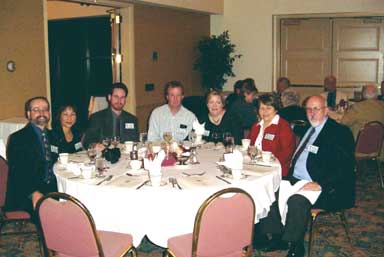 |
| The Phoenix EMC Chapter officers
and their spouses attended the Phoenix IEEE Section’s
Annual Awards Banquet where vice-chairperson, Daryl Gerke,
was presented with a technical achievement award for his presentation
on the “Mysteries of Grounding.” From left are Harry
and Lo-An Gaul, Steve Gerard, Terry and Suzie Donohoe, and
Mary and Daryl Gerke. |
Phoenix
Harry Gaul reports that all had an exciting time at the February
19th IEEE EMC Society Phoenix Chapter meeting held at the Marriott
Mountain Shadows in Scottsdale. This was a joint meeting held
in conjunction with the EMC Society’s Board of Directors
meeting. The attendees enjoyed some wonderful hors d’oeuvres
and drinks by the pool prior to the presentation on reverberation
chambers by Mike Hatfield of the Naval Surface Warfare Center
Dahlgren Division.
Mike spoke on “How to Conduct Electromagnetic Effects Testing
Using a Microwave Oven and a Pair of Dice, Or, A Statistical Approach
for Conducting System Electromagnetic Vulnerability Assessments.”
Mike began his talk with a short history of actual devastating
HERO problems in the Navy followed by an in-depth look at the
statistical basis for repeatability in mode-tuned chambers as
a function of the number of tuner positions. The premise of Mike’s
talk was that large uncertainties in the test process would lead
to inconclusive statistical results for the safety of ordnance
systems. He contrasted the typical anechoic chamber test method
which tends to have too few of aspect angles versus mode-stirred
chambers where the directivity tends to get washed out. Mike made
the comment that the peak of the mode-stirred responses will equate
to the average of the anechoic chamber responses given a sufficient
number of tuner positions in the reverberation chamber and aspect
angles in an anechoic chamber. Mike provided some interesting
test results for measuring the shielding effectiveness of boxes.
As it turned out, the anechoic chamber results were much more
uniform when a mechanical stirrer was placed inside the box. The
test results obtained in reverberation chambers were amazingly
repeatable across multiple test labs. A lively discussion ensued
at the end of the presentation concerning stirring as opposed
to stepping the tuner and the loss of statistical significance
because of the response time of the unit under test.
Information on future meetings is available on the Phoenix EMC
Chapter Web site at https://www.ewh.ieee.org/r6/phoenix/phoenixemc/.
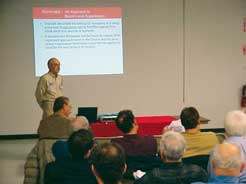 |
| Roger Swanberg of DLS Electronic
Systems gave a presentation on board level suppression to
the Chicago EMC Chapter. |
Chicago
Roger Swanberg of DLS Electronic Systems gave a riveting presentation
to the Chicago Chapter entitled, “An Approach to Board Level
Suppression.”
This talk covered the setup and operation of a low cost suppression
site. It showed an approach to setting up and using a site for
identifying and suppressing EMI signals from small electronic
devices or systems. These emissions can be identified by means
of a systematic, organized approach down to the device and pin
level where suppression techniques can then be applied. EMC
|
|
|
 Chapter
Chatter
Chapter
Chatter